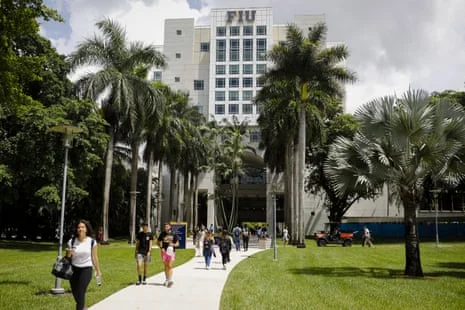
What Lies Ahead for Florida’s International Students Amid New ICE Agreements?
As the turmoil over immigration enforcement intensifies, students at Florida's universities find themselves in a precarious position. Following recent agreements between campus police and U.S. Immigration and Customs Enforcement (ICE), fears are burgeoning among communities of international students concerning their safety and status in the U.S. This development holds significant implications for the over 63% of students at Florida International University (FIU) who identify as Hispanic or Latino, and prompts wider questions about the evolving landscape of immigration policy and its consequences on academic environments.
In what many critics have termed an alarming policy shift, the 287(g) program now allows campus police to act as federal immigration agents. Miami's FIU has joined at least 11 other state colleges to embrace this initiative aimed at enhancing local law enforcement's capacity to engage in immigration operations. Proponents claim that campus safety will benefit from these agreements, yet students are expressing levels of anxiety and distrust that were previously uncharted.
"It's scary and nerve-racking," said one FIU undergraduate, who prefers to remain anonymous due to concerns over legal status. Coming to the U.S. as a child fleeing gang threats in El Salvador, he now grapples with the haunting uncertainty of his position in a country that feels increasingly hostile. Students, particularly those from immigrant backgrounds, report altering their routines to avoid areas where police patrol, establishing a tense atmosphere on campus.
At other universities such as the University of Florida and Florida State University, similar agreements have sparked outrage and organized protests. Demonstrations have erupted, spotlighting the sentiments much larger than the legal agreements themselves. Activists and educators alike worry that the presence of ICE within educational institutions tacitly criminalizes students for their immigration statuses and diminishes the sense of security these campuses were supposed to provide.
"Universities have usually been considered free spaces, open spaces," noted Terrence Peterson, a history professor at FIU. With over 3,800 international students enrolled at the institution, the collaboration between the police force and ICE prompts many, including education professionals, to pose troubling questions. "How can students feel safe if the people who are supposed to protect them may also act as ICE agents?" asked one senior faculty member, reflecting a growing consensus of concern.
Florida Governor Ron DeSantis has championed these agreements, positioning the state as a leader in combating illegal immigration; he defines the partnerships as a restoration of law and order. However, many faculty and student groups see this as playing into a broader agenda that undermines trust and inclusivity on campuses. "This is exactly how it used to be in Latin America," commented one anonymous professor, drawing parallels to oppressive regimes.
In a bid to reassure the campus community, FIU’s police chief Alexander Casas argued that their approach would make ICE enforcement more considerate and attuned to campus culture. Nonetheless, many remain unconvinced. During a heated Faculty Senate meeting, members expressed that these agreements contradict the university’s core values, urging university leadership to reconsider the ramifications.
The resounding message from activists is clear: institutions should prioritize student safety and diversity over politically motivated initiatives. As Florida's universities navigate this tense intersection between safety and immigration enforcement, the question hangs: how will they protect and empower the diverse communities that form their backbone?
This unfolding situation warrants ongoing attention and discourse, as students and faculty alike call for a commitment to inclusivity rather than fear-based policies. Readers are encouraged to reflect on the implications of these agreements and share their thoughts in the comments below.
Latest
Can you Like
In a striking critique of the Trump administration's handling of deportation cases, U.S. District Judge Paula Xinis has firmly chastised government officials for their failure to comply with court ord...
Recent agreements between several Florida universities and U.S. Immigration and Customs Enforcement (ICE) have sparked significant controversy and concern among students, faculty, and community member...
In a significant escalation of border enforcement, U.S. authorities have begun detaining green card holders at the border, marking a new phase in the Trump administration's immigration crackdown. Repo...